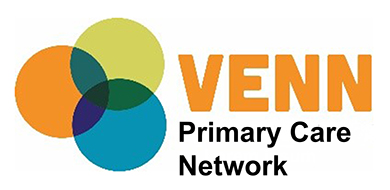MENOPAUSE

Menopause marks the end of a woman's reproductive years, typically occurring between the ages of 45 and 55. It is characterised by the cessation of menstrual periods due to the decline in oestrogen and progesterone production.
This natural biological process can bring about various physical and psychological changes that can significantly impact a woman's quality of life.
Services Offered by the NHS and Venn PCN
Our practice, as part of the Venn Primary Care Network (PCN), offers comprehensive support for women going through menopause:
- Menopause Clinic:
Patients can arrange an appointment through the practice for a blood test and subsequent consultations with a GP to discuss results and treatment options. - Health & Lifestyle Support:
Non-clinical practitioners provide guidance on diet, exercise, and lifestyle changes to manage symptoms. - Social Prescribing:
Connects patients to community groups and services for additional support with social, emotional, or practical needs.
To arrange an appointment with a Venn menopause clinic, please contact the Practice requesting a referral to the Menopause Clinic. An appointment will be arranged for a blood test. Once your results are available the GP will review these. You will then receive a text message/phone call to arrange your initial appointment. Full details are available on the Venn PCN website:
For more detailed information, visit the Venn PCN website Menopause Portal to learn about the specific services and self-referral options available.
>> VENN PCN MENOPAUSE PORTALSymptoms of Menopause
Menopause symptoms vary widely but commonly include:
- Hot flashes and night sweats
- Irregular periods
- Vaginal dryness and discomfort during intercourse
- Sleep disturbances
- Sleep disturbances
- Mood swings, anxiety, and depression
- Weight gain and slowed metabolism
- Thinning hair and dry skin
Treatment Options
- Hormone Replacement Therapy (HRT):
Effective in relieving many menopausal symptoms by replenishing estrogen levels. HRT should be discussed with a healthcare provider to understand the benefits and risks. - Non-Hormonal Medications:
Options such as antidepressants, blood pressure drugs, and other medications can help manage specific symptoms like mood swings and hot flashes. - Lifestyle Modifications:
Regular exercise, a healthy diet, and adequate sleep can alleviate symptoms. Stress reduction techniques such as yoga, meditation, and mindfulness can also be beneficial. - Alternative Therapies:
Some women find relief with acupuncture, herbal supplements, and other non-traditional treatments. Always consult with a healthcare provider before starting any alternative therapy.
Dilemmas
Navigating menopause can present several challenges, including:
- Emotional and Psychological Impact:
Dealing with mood swings, anxiety, and depression can be challenging. Support groups and counseling can provide emotional support - Physical Changes:
Symptoms like hot flashes and sleep disturbances can affect daily life and overall well-being. - Healthcare Decisions:
Choosing the right treatment option requires careful consideration and discussion with healthcare providers to weigh the benefits and risks of different therapies.
